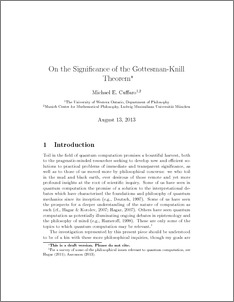Cuffaro, Michael E.
(2013)
On the Significance of the Gottesman-Knill Theorem.
In: UNSPECIFIED.
![[img]](https://philsci-archive.pitt.edu/style/images/fileicons/application_pdf.png)  Preview |
|
PDF (Draft. Comments welcome.)
sufficiency_of_entanglement.pdf
- Draft Version
Download (301kB)
|
Abstract
According to the Gottesman-Knill theorem, quantum algorithms utilising operations chosen from a particular restricted set are efficiently simulable classically. Since some of these algorithms involve entangled states, it is commonly concluded that entanglement is not sufficient to enable quantum computers to outperform classical computers. It is argued in this paper, however, that what the Gottesman-Knill theorem shows us is only that if we limit ourselves to the Gottesman-Knill operations, we will not have used the entanglement with which we have been provided to its full potential, for all of the Gottesman-Knill operations are such that their associated statistics (even when they involve entangled states) are reproducible in a local hidden variables theory. It is further argued that considering the Gottesman-Knill theorem is illuminating, not only for our understanding of quantum computation, but also for our understanding of what we take to be a plausible local hidden variables theory, as well as for our understanding of the relationship between all-or-nothing inequalities such as GHZ, and statistical inequalities such as CHSH.
Available Versions of this Item
Monthly Views for the past 3 years
Monthly Downloads for the past 3 years
Plum Analytics
Actions (login required)
 |
View Item |




